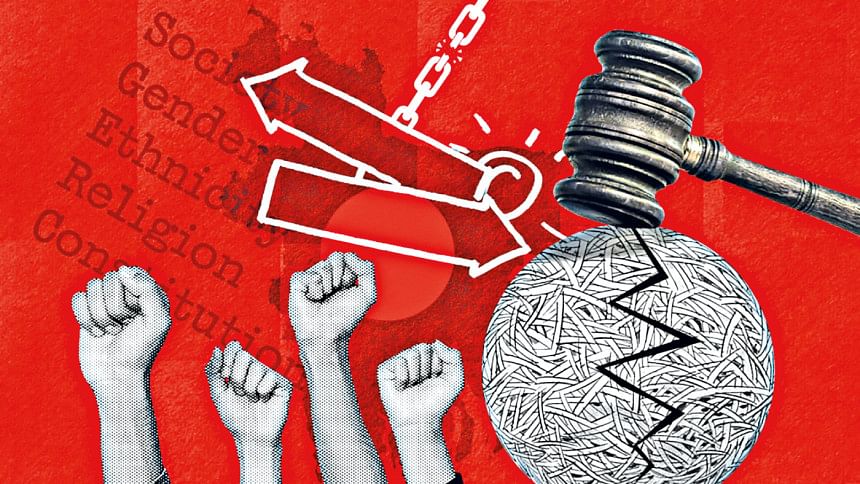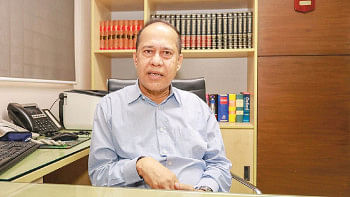Five reform proposals to ensure a more democratic constitution

During the 2024 anti-discrimination movement, the people of Bangladesh shed their blood on the streets to achieve a fair and just society. The movement raised a burning question in its immediate aftermath: Does our current Constitution empower us to achieve the ideals our martyrs gave lives to protect? Many claim that our existing Constitution is a barrier to this vision. Although opinions differ on whether it is required that we adopt a new constitution or amend the current one, there is a consensus that significant changes are needed for a better democracy. Here are five constitutional reform proposals that may help make our system a more democratic one.
Firstly, the judiciary must have a separate secretariat under or within the Apex Court. Currently, the President cannot act independently of the advice of the Prime Minister (PM), except for the appointment of the PM itself and that of the Chief Justice, as mandated by Article 48(3) of the Constitution. Thus, the PM has been given the power to control the President's actions, which extends to the matters related to judiciary as well. For example, according to Article 116 of the Constitution, the President, in consultation with the Supreme Court, has the authority to manage and discipline employees in the judicial service and magistrates who perform judicial duties. But the President cannot make decisions without the advice of the PM. This practice results in the subordinate courts often facing pressure from the executive branch. Indeed, a separate secretariat for the judiciary that looks after the administrative matters is a must to ensure judicial independence.
Secondly, the members of the Supreme Judicial Council should be increased and be appointed on an ad hoc basis. In Government of Bangladesh & others v Advocate Asad-uz-zaman Siddiqui & others [(2017), the Appellate Division (AD) noted that if Parliament can remove a Judge of the Supreme Court, it could exert undue pressure on the judiciary. Citing that reason, the AD restored the Supreme Judicial Council system in removing judges. On the other hand, many would argue that without such power in the hands of the parliament, the judiciary could become unchecked and tyrannical. One possible solution to this scenario can be to reform the Supreme Judicial Council by expanding the number of its members to include two members from the legislative branch, one from the ruling party, another from the opposition, as well as the Judges from all branches of the Judiciary (AD, High Court Division and Subordinate Courts). These committee members will not be pre-fixed but be formed on an ad hoc basis. This approach would further ensure collaboration between the legislative and judicial branches.
Thirdly, floor-crossing should be allowed, but only in certain circumstances. Article 70 of the Constitution does not allow a member of the Parliament to vote against his/her own political party. One is bound to vote for their own party or remain silent regardless of their viewpoint on that said matter. Thus, MPs become hostages in the hands of their party's high command. One may argue that the absence of Article 70 would allow illicit floor crossing causing the government to fall. Taking such view into consideration, the proper solution is to make Article 70 inapplicable unless there is a vote of confidence on the PM and the budget bill.
Fourthly, Article 7B should be removed from the Constitution. Article 7 states, "All powers in the Republic belong to the people, and their exercise on behalf of the people shall be effected only under, and by the authority of, this Constitution." Therefore, people are the primary source of power. Article 7(2) further explains that this Constitution is the solemn expression of the will of the people. However, Article 7B of the Constitution makes many provisions of the Constitution unamendable. Thus, there is an obvious conflict between Articles 7 and 7B. If the people are supreme, how can they not amend the Constitution as per their will?
Finally, referendum should be included as a condition for binging in constitutional amendments. True that the basic structure doctrine is not a good sign for our Constitution. An incumbent parliament should not be able to take away or limit the power of a future Parliament. Also, as the world is changing rapidly, our Constitution should adapt to new needs. Fifty years later, our fundamental rights and state policies may change, but because of the entrenchment of basic structure, we cannot adopt the demands of time to our Constitution. One possible solution is to introduce referendum. A system should be adopted where the parliament would have to propose a constitutional amendment with a two-third majority, and then the people would get it ratified it with a referendum.
Apart from these reforms, we may need to change many other provisions of our Constitution in the future. We must understand that reform does not undermine our constitutional practice but reflects our democratic spirit. Through reform, we can create a new Bangladesh where power belongs to the people, justice is delivered equitably, and democracy is not codified only as a principle but also as a practice for the people to live by.
The writer is undergraduate law student at North South University.

 For all latest news, follow The Daily Star's Google News channel.
For all latest news, follow The Daily Star's Google News channel. 



Comments